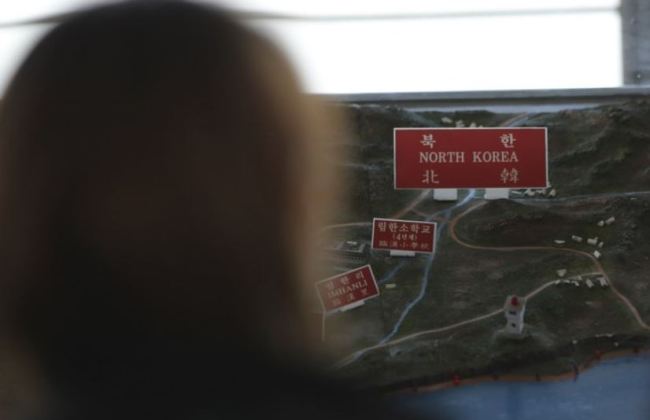No. of visitors to S. Korean border city soars following historic inter-Korean summit
By YonhapPublished : May 20, 2018 - 13:30
PAJU, Gyeonggi Province -- The number of visitors to security-related tourist sites in the South Korean border city of Paju near the western inter-Korean border increased sharply following the historic inter-Korean summit last month that gave rise to a thaw in relations with the North, the Paju municipal government said Sunday.
Since the inter-Korean summit between South Korean President Moon Jae-in and North Korean leader Kim Jong-un on the southern side of the truce village of Panmunjeom in the Demilitarized Zone on April 27, the number of tourists to such attractions has risen to around 1,500-3,000 per day, up 30 percent from 1,200-2,300 in the same period last year.
Major tourist attractions in the city include an underground tunnel dug by the North with the intent of invading the South, the Doras and Odusan Unification Observatories, which offer views of the North’s border town of Kaesong, and Imjingak Pavilion, where many visitors look at the North through binoculars.
Since the inter-Korean summit between South Korean President Moon Jae-in and North Korean leader Kim Jong-un on the southern side of the truce village of Panmunjeom in the Demilitarized Zone on April 27, the number of tourists to such attractions has risen to around 1,500-3,000 per day, up 30 percent from 1,200-2,300 in the same period last year.
Major tourist attractions in the city include an underground tunnel dug by the North with the intent of invading the South, the Doras and Odusan Unification Observatories, which offer views of the North’s border town of Kaesong, and Imjingak Pavilion, where many visitors look at the North through binoculars.

In the May 1-13 period, the accumulated number of visitors to the underground tunnel, Imjingak Pavilion and Odusan Unification Observatory came to 28,632, 177,319 and 25,924, respectively.
The city government also attributed the rise to an increase in the number of Chinese tourists visiting the city after Chinese cities lifted their suspension of package tour programs to South Korea, imposed amid a diplomatic feud between the two countries.
The bilateral rift over the deployment of a US missile defense system in South Korea brought Chinese group tours to the South virtually to a halt in 2017.
At the historic inter-Korean summit, the leaders of the two Koreas agreed to pursue “complete denuclearization” of the peninsula and strive to formally end the 1950-1953 Korean War, which ended only with an armistice agreement signed on July 27, 1953, by the US-led United Nations Command, North Korea and China. (Yonhap)





![[Herald Interview] 'Amid aging population, Korea to invite more young professionals from overseas'](http://res.heraldm.com/phpwas/restmb_idxmake.php?idx=644&simg=/content/image/2024/04/24/20240424050844_0.jpg&u=20240424200058)












![[KH Explains] Korean shipbuilding stocks rally: Real growth or bubble?](http://res.heraldm.com/phpwas/restmb_idxmake.php?idx=652&simg=/content/image/2024/04/25/20240425050656_0.jpg&u=)

